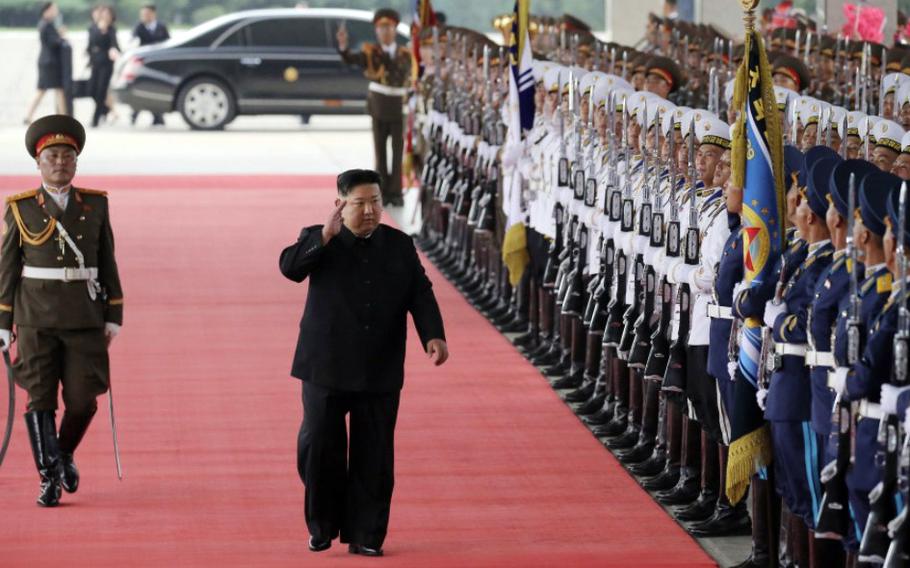
North Korean leader Kim Jong Un departs Pyongyang for Russia in this image issued by the state-run Korean Central News Agency on Sept. 12, 2023. (KCNA)
North Korea continues to evade U.N. Security Council sanctions and the United States ought to seek assistance from other governmental organizations to impose additional penalties for the communist regime’s weapons program, experts testified at Capitol Hill on Wednesday.
Sanctions enforcement against Pyongyang “is in desperate need of a revamp,” Scott Snyder, a senior fellow at the Council on Foreign Relations, said in written testimony to a Senate subcommittee.
Russia and China engage in “back door” trade with North Korea, which benefits from the two countries’ geopolitical rivalry, according to Snyder’s testimony submitted Wednesday to the subcommittee on East Asia, the Pacific and International Cybersecurity Policy.
“The United States should pursue the establishment of a broad multilateral sanctions regime among like-minded actors … to interdict illicit North Korean commercial transfers,” Snyder wrote. “By building a coalition of the willing, the United States can sustain some pressure on North Korea while attempting to bypass Chinese and Russian non-cooperation through the pursuit of secondary sanctions …”
Several individual countries target North Korea with sanctions. These include the United States, South Korea, Japan and Australia, as well as multinational organizations like the U.N. Security Council and the European Union.
The wide-ranging sanctions restrict those countries and organization members from dealing with North Korean assets, business entities and individuals. The sanctions also seek to curtail the regime’s ballistic missile testing program.
North Korea has defied the ban and so far this year has fired 21 ballistic missiles in 14 separate days of testing. The Supreme People’s Assembly also amended the national constitution last month to “exponentially” boost nuclear weapons production.
Further defying sanctions, North Korea in 2022 also traded commodities such as coal and refined petroleum with China-flagged ships in its exclusive economic zone, according to a Security Council report in March.
National Security Council spokesman John Kirby, citing U.S. intelligence, accused North Korea of secretly supplying Russia with artillery shells in November for its invasion of Ukraine.
The Security Council in May for the first time since 2006 failed to approve fresh sanctions against North Korea when Russia and China’s ambassadors vetoed the measures.
Victor Cha, a government professor at Georgetown University and a former National Security Council director for Asian Affairs, also testified before the Senate subcommittee Wednesday and recommended the U.S. “seek coordinated responses in the form of sanctions” through the Group of Seven Plus and the Asia-Pacific 4.
The Group of Seven Plus is an intergovernmental organization of 20 countries undergoing extreme hardship or conflict, such as Afghanistan, Somalia, Yemen and the Democratic Republic of the Congo. The Asia-Pacific 4 consists of four non-NATO countries: Australia, South Korea, Japan and New Zealand.
“It is no longer possible to seek action on North Korea through the U.N. Security Council given Russia and China’s opposition,” Cha told lawmakers in his introductory remarks.